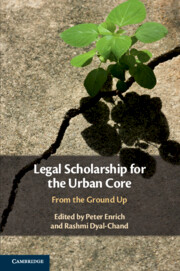Book contents
- Legal Scholarship for the Urban Core
- Legal Scholarship for the Urban Core
- Copyright page
- Contents
- Editors and Contributors
- 1 Introduction
- Part I Change on the Ground
- Part II Reimagining Law for the Urban Core
- 4 Community Development Finance and Economic Justice
- 5 How to Increase Our Affordable Housing Stock
- Part III The Legal Academy and the Urban Core
- Index
4 - Community Development Finance and Economic Justice
from Part II - Reimagining Law for the Urban Core
Published online by Cambridge University Press: 22 June 2019
- Legal Scholarship for the Urban Core
- Legal Scholarship for the Urban Core
- Copyright page
- Contents
- Editors and Contributors
- 1 Introduction
- Part I Change on the Ground
- Part II Reimagining Law for the Urban Core
- 4 Community Development Finance and Economic Justice
- 5 How to Increase Our Affordable Housing Stock
- Part III The Legal Academy and the Urban Core
- Index
Summary
On the rugged coast of Maine in 1978, an emerging community development organization called Coastal Enterprises, Inc. (CEI) helped secure financing to successfully rebuild a fish storage and processing plant that had been destroyed by fire.1 Founded a year earlier, the organization began as a modest effort to create and preserve jobs in Maine’s natural resources industry and rural small business sector. It was modeled on the community development corporation (CDC), a form of nonprofit entity that emerged in the civil rights era of the 1960s and proliferated primarily in disadvantaged urban neighborhoods in the years to follow. In contrast to the dominant urban CDC model, CEI worked in the rural setting of Maine and focused its housing and job-creation efforts in small towns and in the state’s natural resources sectors of fish, farms, and forests.
- Type
- Chapter
- Information
- Legal Scholarship for the Urban CoreFrom the Ground Up, pp. 88Publisher: Cambridge University PressPrint publication year: 2019

